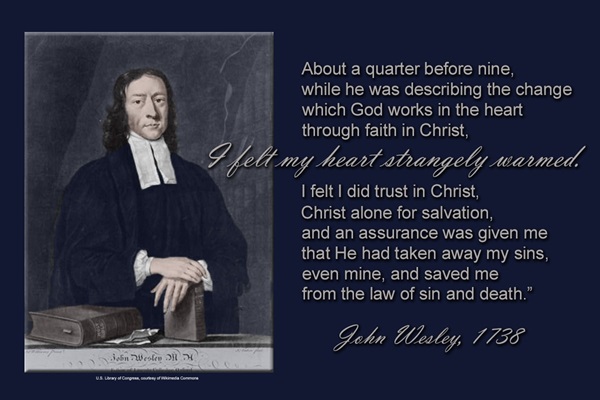United Methodists understand that people have different experiences of awakening and turning to God. Some may have a sudden, powerful experience. For others, it’s more gradual.
Here’s how our statement on baptism, By Water and the Spirit, explains it:
"Our personal response of faith requires conversion in which we turn away from sin and turn instead to God. It entails a decision to commit our lives to the Lordship of Christ, an acceptance of the forgiveness of our sins, the death of our old selves, an entering into a new life of the Spirit — being born again (John 3:3-5, 2 Corinthians 5:17). All persons do not experience this spiritual rebirth in the same way. For some, there is a singular, radical moment of conversion. For others, conversion may be experienced as the dawning and growing realization that one has been constantly loved by God and has a personal reliance upon Christ."
During certain seasons, like Aldersgate Day and Heritage Sunday, United Methodists may focus on John Wesley’s experience of having his heart “strangely warmed” as he attended a Moravian Society study session on Martin Luther’s commentary on Romans. This was a definitive, memorable experience for Wesley at the time, and one that led him to wonder whether he had ever actually been a Christian before the sense of assurance he felt that night.
Throughout their ministry, Wesley and his brother, Charles, who had a similar experience a few days prior, often sought to describe the value of such a “heart-warming” and memorable experience. What the Wesleys never did, however, was insist that such an experience was necessary before people could properly say that they were growing Christians continuing in the way that leads to life.
Indeed, John did not say that his Aldersgate Street experience was fully definitive for him. In the days that follow, he notes in his journal that he had some sense of peace, but not yet of joy. It wasn’t until two weeks later, June 6, 1738, that he describes experiencing joy, and that was fleeting. A letter he received from an unnamed believer stated that if he had any doubt at all, he had no faith at all. What restored him wasn’t another “experience,” but rather making use of the means of grace of “searching the Scriptures,” in which he found texts that comforted him, assuring him that any measure of faith was indeed faith, and that growth was always possible from there. See "The Journal of The Rev. John Wesley," Nehemiah Curnock, Editor (London: Robert Culley, 1909), 476-482.
So what do we see in this “memorable moment?” Such a moment was important, but not in isolation from many more, and from a host of ongoing conversations, practices and intentionally making use of the means of grace as Wesley had also done prior to the Aldersgate experience.
The same is often true for us. While God can come to us at any time and any place, it is often helpful to prepare our hearts to be receptive to the Holy Spirit stirring within us. The means of grace, regular practices of studying Scripture, receiving communion, responding to human need, and working for justice, put us in a place where we are open to receiving the grace of God.
Some of us may experience profound and memorable moments of assurance, as John and Charles Wesley both did in 1738. But those moments are not the full or even a very large part of our actual story of salvation. They may instead be seen as extraordinary moments on the way toward our complete salvation, our lives becoming filled with God’s love and fully aligned with God’s will over time.
This content was produced by Ask The UMC, a ministry of United Methodist Communications.





